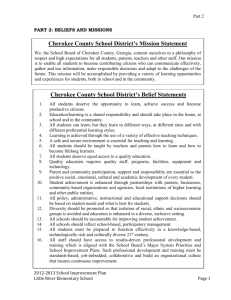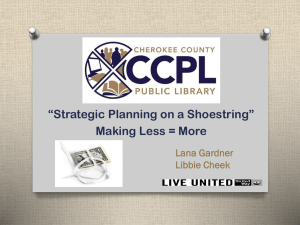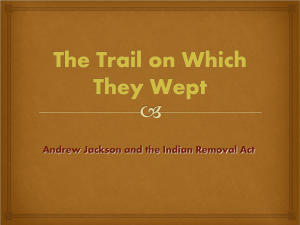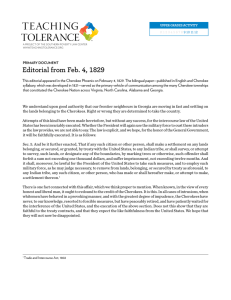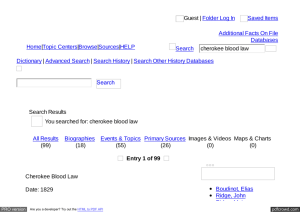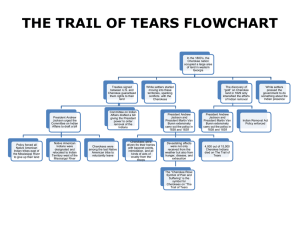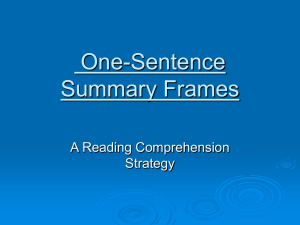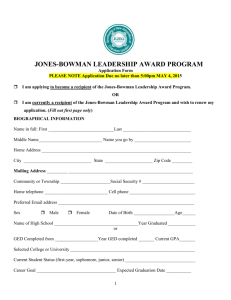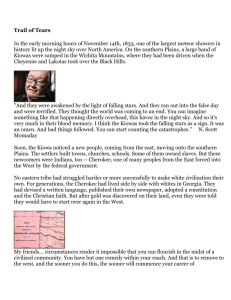How the people ofthe Cherokee Nation became exiles in their own
advertisement
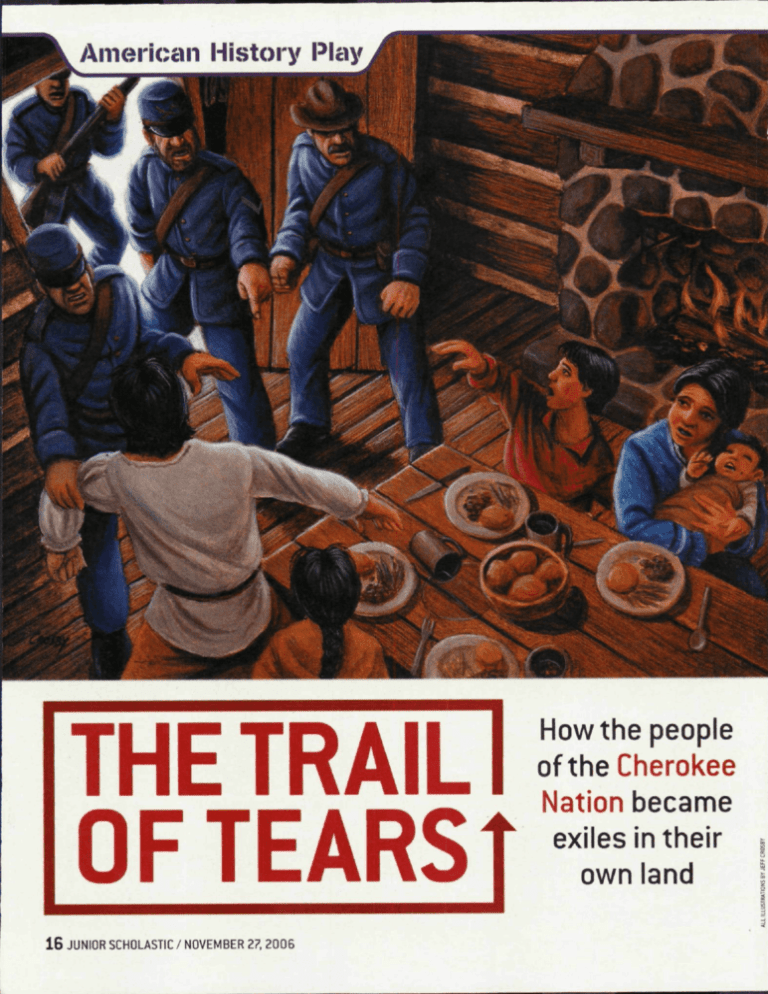
History PUiy THE TRAIL I 0 F TEARS t 1 6 JUNIOR SCHOLASTIC / NOVEMBER 27, 2006 How the people ofthe Cherokee Nation became exiles in their own land Prologue Narrator A: Again and again, rifle butts struck cabin doors. The doors burst open, and soldiers with bayonets barged in, People at their meals, including children and the elderly, were forc«i from their homes and cursed at. Farmers in the field were dragged away, unable to join their families. Narrator B: In the spring and summer of 1838, life changed forever for the Cherokee Indians of the American Southeast. Narrator C: President Andrew Jackson had already forced some Cherokee to give up their ancestral lands for territory far to the west, in what is now Oklahoma (see map, 20). Beginning in May 1838, the U.S. Army drove the remaining families from their homes. How could this happen in a country dedicated to the rights of its citizens? SCIiNIE ONE Narrator D: Our story begins in 1829, when the United States is a country of 24 states, lying mainly along the East Coast. The nation is pushing at its boundaries—and white settlers are hungry for land. The Cherokee of the Southeast have tried to adapt to the newcomers. Many are farmers and live in wood or log houses. The most prosperous Cherokee wear the fashionable clothes of white city dwellers, ride in handsome carriages, and live in two-story plantation houses. Narrator E: On territory granted to them by treaties with the U.S., the Cherokee create their own government and constitution, modeled on those of the U.S. The heart of Cherokee Nation lies in Georgia. In their capita! of New Echota (EE-choh-tuh), Principal Chief John Ross meets with his adviser Major Ridge, Ridge's son John, and Elias Boudinot. The men are worried. John Ross: Bad news. Whites have run Characters John Ross, Principal Chief ofthe Cherokee Major Ridge, Cherokee leader John Ridge, Cherokee leaden Major Ridge's son Cherokee Woman Supporter Friend Elias Boudinot (BOO-dih-noh), editor of The Cherokee Phoenix; John Ridge's cousin off with more of our farmers' horses. Major Ridge: The trouble has grown, . worse since the Georgia Legislature claimed our lands last year. Whites think they can steal from us, and the U.S. govemment refuses to honor its treaties with the Cherokee. John Ridge: Father, you and John fought with President Jackson in the war against the Creek. Can't you persuade him to protect us? Major Ridge: I don't know. Long ago we buried the tomahawk and accepted the white people. I'm proud that you have been educated in their schools and speak their language so well. What else can we do? Ross: Whatever it is, 1 am determined that it will be peaceful. We cannot go back to the days of war. Narrator F: There is a loud noise outside, The men rush to see what is happening. A horse-drawn wagon carrying three white settlers rides recklessly through town. Cherokee Woman (shouting after them): Bad men! Watch where you're going! Ross: They heard that gold was discovered here. Now settlers are pouring in. John Ridge: Another reason to get rid of us. We must stop them. Etias Boudinot: We should organize and force Georgia to honor our treaties with Washington. Andrew Jackson, President of the United States John C. Schermerhorn (SKURmur-hornj, President Jackson's representative to the Cherokee Soldier Cherokee Father Cherokee Mother Cherokee Girl Cherokee Boy Narrators A-F Narrator A: The Cherokee file the first of two lawsuits challenging Georgia's laws. The suits demand that the state honor the federal government's treaties with the Cherokee. Both suits will go all the way to the U.S. Supreme Court. John Ridge: However long it lakes, I am confident that we will prevail. SCIENE TWO Narrator B: President Andrew Jackson intends to "remove" the Indians to unsetded lands west of the Mississippi River. At Jackson's urging. Congress passes the Indian Removal Act in May 1830. Still, the Cherokee hope to win in court. In February 1832, John Ridge and Boudinot receive news from a white supporter. . . Supporter: Did you hear? The Supreme Court has spoken! Ghief Justice Marshall and his Court ruled that Georgia's laws are unconstitutional. Boudinot: At last we have won! John Ridge: Our long wait has paid off. Narrator C: But soon thereafter. Ridge hears disturbing news from a friend in Washington. Friend: I'm sorry, John. President Jackson will not make Georgia obey the Court's order. Narrator D: Desperate, Ridge asks to meet with President Jackson. John Ridge: Mr. President, the Supreme JUNIOR SCHOLASTIC / NOVEMBER 27.2006 1? American History i'lay Court has ruled iu our favor. But wit! the United States government back us? Andrew Jackson: Out of respect for your father, I will tell you bluntly; No. The people of Georgia want your land and, in the end, they will get it. John Ridge: But our treatiesJackson: Look, John. In the vacant lands of the West, the Cherokee Nation can grow to be the equal of the U.S. But if you try to stay here, your people will risk utter destruction. I beg you to go home and convince them. It is for your own good. John Ridge: Sir, you have put me and my people in a terrible situation. Narrator E: Ridge leaves in despair. He soon comes to realize that the Cherokee have nowhere to turn. SCENI- THREE Narrator F: Months later, Cherokee leaders meet in Red Clay, Tennessee. By now, John Ridge believes that the Cherokee must agree to removal Ross: Are you saying we should take the white man's deal and leave our land? Those are the words of a traitor! John Ridge: And yours are the words of a fool. We have to make the best deal we can with Washington. Otherwise, Georgia will surely seize our land. Ross: We must fight on! In the Court's ruling we have a strong weapon—the strongest in this land. John Ridge: Your head is hard, and so is your heart! President Jackson will not enforce the Court's ruling. You are giving our people false hope. Ross (tamins to Major Ridge): And you, old friend? Where do you stand? Major Ridge: My heart grieves to say this, but I believe my son is right. Narrator A: The dispute causes a bitter split among the Cherokee. The Ridges and Boudinot form a faction called the Treaty Party. Most Cherokee stay 1 8 JUNIOR SCHOLASTIC / NOVEMBER 27, 2006 with Ross's National Party, which opposes removal. President Jackson refuses to deal with Ross and his group. On December 28, 1835, the Treaty Party gathers at New Echota to sign a new treaty with Jackson's representative. John C. Schermerhorn: My friends, the Great Father, President Jackson, has been more than generous. With this Treaty of New Echota, the U.S. government will give the Cherokee 5 million dollars! In return, you agree to trade your land here for an equal amount in Indian Territory. Major Ridge (to his son): Look around. Most of our people have stayed away. They want no part of this new treaty. John Ridge: Ross thinks he can beat the U.S. government. We must save as many of our people as we can. Major Ridge: Yes, but by signing this treaty, I fear I am also signing my death sentence. Cherokee Mother: Why have we stopped moving? Cherokee Father: There is ice on the river and no way to get a boat across. We must wait for a thaw. Cherokee Girl: Mother, that man is just lying there in the snow. He will die if we don't help him. Cherokee Boy: Many people have given up. They have no blankets or shoes. Cherokee Mother: Set your face to the sun, children. We must look to the future in order to survive. Narrator D: The journey of more than 800 miles takes several months. Of the estimated 18,000 Gherokee who set out in 1838, at least 4,000 die. One of them is John Ross's wife, Quatie, who had given her blanket to a sick child. Narrator E: The survivors come to call their path the Trail Where They Cried. We know it as the Trail of Tears. RiCSiHTS? For nearly two centuries, Native Americans did not have the full benefits of U.S. citizenship. '1789: The U.S. Constitution gives Congress power to "regulate Commerce... with the Indian Tribes." Indians are not counted as U.S. citizens. 1887: Congress passes the Dawes Act. tt is partly an attempt to break up Indian tribes in the West. The law offers citizenship to every Indian who moves off Indian land "and has adopted the habits of civilized life." SCENIE FIVE SCE\ME FOUR Narrator B: By late 1837, the Ridges and about 2,000 Cherokee have already moved west, to land granted them by the Treaty of New Echota. Then, on May 18, 1838, a shock comes to Ross and the many Gherokee who have stayed behind in Georgia. Soldier (pounding on a cabin door): Open up! By order of the U.S. government, you must leave this place today. Cherokee Girl: Mother, I'm scared! Cherokee Boy: What's happening? Why are soldiers here? Cherokee Father: Get out of my home! Narrator C: Gherokee are thrown into temporary camps without enough food and water. Then they are forced to move west. Some are packed into disease-ridden boats or railroad boxcars. Most must travel by foot. In winter, the journey becomes more difficult. Narrator F: As Major Ridge predicted, signing the treaty proves fatal to him. On June 1839, Ridge, his son John, and Elias Boudinot are all assassinated by opponents of the Treaty Party. Narrator A: Removal to Indian Territory does uot solve the Indians' conflicts with the U.S. Soon, the country will grow to surround and claim much of their new land. But Jackson's prediction is also right. Removal allows tbe Cherokee to avoid destruction and retain their identity as a tribe. Tbe misery it caused will become another part of the Cherokee heritage. —Bryan Brown 1890: The Indian Naturalization Act allows Native Americans to apply for citizenship, as immigrants do. 1924: The Indian Citizenship Act extends citizenship and voting rights to all Native Americans. Some states continue to have laws that discriminate against Indians. 1957: Utah repeals (reverses) a state lawthat says Indians living on reservations cannot vote. Utah is the last state to eliminate such discriminatory voting practices. Think About It Do you think the Treaty Party made the best decision under the circumstances? Why or why not? Was President Jackson justified in removing the Cherokee? Explain. 1968:The Indian Civil Rights Act gives Indians protections against their tribal governments similarto those ofthe U.S. Constitution's Bill of Rights. JUNIOR SCHOUSTIC / NOVEMBER 27, 2 0 0 6 19
